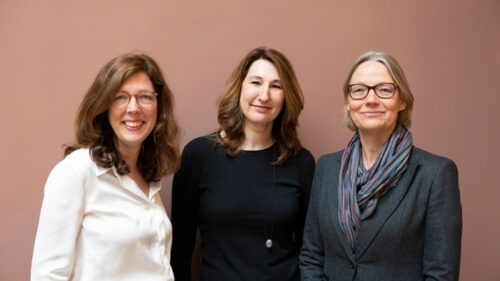Dialogue and experimentation to embed Recognition and Rewards within the whole University
A culture change is needed within the University in the area of Recognition and Rewards, and a start can now be made on bringing about that change. The Recognition and Rewards steering group has published a change vision and recommendations people can start to work with. Their advice has been welcomed by the Executive Board. Experimentation and dialogue are the way forward to implement the vision.
Two years ago, the steering group was asked by the Executive Board to translate the national initiative for a new system of recognition and rewards for academics and their work to the Leiden context, the chairs of the steering group Manon van der Heijden and Sarah de Rijcke explain. Van der Heijden was scientific director of the Institute of History and is professor of Urban History. De Rijcke is professor of Science and Evaluation Studies and director of the Centre for Science and Technology Studies.
The intention is that the Recognition and Rewards programme should ultimately lead to a better balance in careers and quality assessment, where attention is also paid to teaching and collaborations. Transparency is important to ensure there is clear insight into career opportunities and rewards, and good academic leadership is needed to bring about the required culture change in a responsible and secure way. These are also the three ambitions promoted by Leiden University in the area of Recognition and Rewards, as described last year in the starting document Academia in Motion.
Using our expertise
'Before making the translation to the Leiden context, we first took a step back,' De Rijcke explains. 'We looked at what we already have within the University in the area of recognition and rewards. We have a lot of scientific knowledge of quality assessments, but we still make too little use of that expertise.' Based on discussions with people within the organisation, an analysis of the current career criteria and a survey among academic staff, the steering group defined Leiden's challenges and ambitions in the area of Recognition and Rewards, and we now have a change vision that will help us achieve these ambitions.
'We have scientific knowledge of quality assessments, but we still make too little use of that expertise' - Sarah de Rijcke
The advice is not simply a set of instructions that can be carried out. Rather, clear frameworks have been formulated relating to key issues of concern, such as how performance and development interviews are currently conducted within the University, or the lack of transparency around appointments. Van der Heijden: 'How we are going to actually implement the change is something we now have to work on together with the whole academic community. Our advice is get on and do that under the leadership of a new steering group and coordinator who will guide the overall process, and to do it at all levels in the organisation based on dialogue and experimentation, making use of good practices and scientific input from the Centre for Science and Technology Studies.'

The steering group has formulated five focus areas and their advice is to leave space for differences among the faculties and scientific institutes. A specially appointed coordinator will encourage, support and facilitate the primary change process throughout the whole organisation, including with working groups for each focus area and in line with the ambitions of the strategic plan. Experimentation should show what works and what doesn't for different departments within the University. It is expected that ultimately a general framework will be formulated for the whole University that will take into account the differences per faculty.
The steering group has formulated five focus areas (the detailed description of these focus areas can be found in the change vision document):
- Develop quality assessment of education, research, societal relevance and teamwork;
- Develop a Portfolio model as the basis for the annual interview or the P&D interview;
- Develop a substantiated CV for appointments and promotions;
- Develop a transparent policy for appointments, permanent appointments and collaboration for all academic staff positions;
- Adjust the profile of managers (focused more on connecting, social competences and teamwork).
Portfolio for P&D interviews
'Dialogue and discussion are key themes throughout our advice, including in our recommendations for the P&D interviews. People at all levels within the organisation have P&D interviews and nobody is happy with them,' says Van der Heijden. The current model with numeric assessments completely misses the point, according to the steering group. 'That's why we are proposing an experiment with a portfolio model. People can fill their portfolio throughout the year and it would be a better basis for the discussion with their supervisor. Faculties can now start looking at how they are going to interpret this.'
'Dialogue and discussion are key themes throughout our advice, including our recommendations for the P&D interview' - Manon van der Heijden
De Rijcke is looking forward to the next concrete step in the process: the recruitment of a coordinator who will help move things along. 'The coordinator can devote his or her time to acting as knowledge broker between the steering group and the faculties, and really set what we have proposed in motion. People are really keen to get started.' Van der Heijden is very curious about the experiments that will be carried out. 'I think we will quickly arrive at some extremely interesting ideas about how we can handle quality assessment better, showing greater transparency and leadership. Maybe the Law School will come up with a really good portfolio model that can be used throughout the whole University.'
Keen to get started?
Colleagues who are already enthusiastic and want to get started with recognition & Rewards would do well to look in their faculty of research institute whether people are already working with it. De Rijcke: 'I can imagine that there will be groups of people within the faculties who want to get ahead and are willing to devote more time to it, which is great. A good way to get started is to look at what colleagues from other faculties are doing and learn from one another's good practices.' Van der Heijden adds: 'We've also developed a roadmap that will facilitate the discussions on Recognition & Rewards, and it's available in the Let’s connect toolkit for anyone who wants to start using it.
Implementation of the advice on Recognition & Rewards will run until 2026. The two professors hope that by that time the first signs of a culture change will be visible. 'I would really like to hear colleagues say: "I can now have a meaningful discussion with my supervisor about my work, rather than being assessed,"' says Van der Heijden. De Rijcke adds: 'Maybe by that time we will have completely diifferent kinds of job promotions, for example for staff who perform really well as teachers. But we do have to bear in mind that this kind of organisational change takes a very long time.'
Hester Bijl gave her reaction to the change vision
'The steering group has developed a clear and well-balanced vision for change and formulated guidelines for taking the next step within the organisation in the area of Recognition and Rewards. Their vision is closely aligned with the ambitions of the Strategic Plan and other ongoing programmes, such as the Leadership Programme. The engagement and reactions of the many colleagues who have been consulted over the past year show that there is a strong desire to work together on this. I fully endorse the importance of the dialogue on this issue and the intention to shape change together on the basis of the focus points that have been formulated. It will take time and attention to achieve change,but I have every confidence that, based on this vision for change and by experimenting and discovering what works best, we now have a good foundation to stay on track.'
Do you have questions, a good practice or ideas after reading the change vision that you would like to share to contribute to the follow-up process? If so, please contact Sarah de Rijcke.

